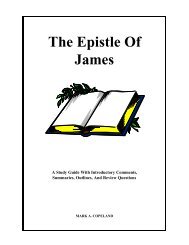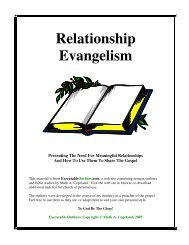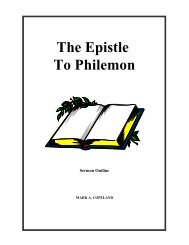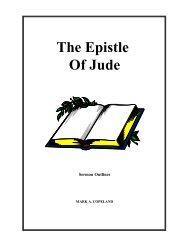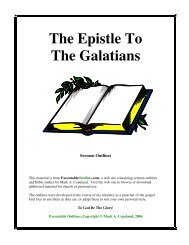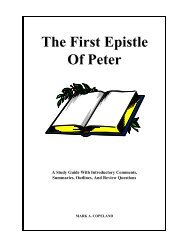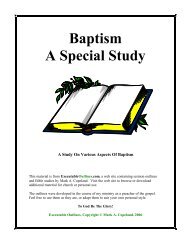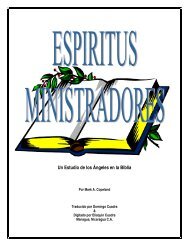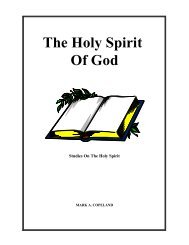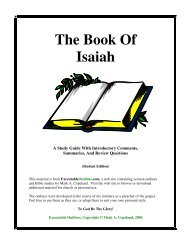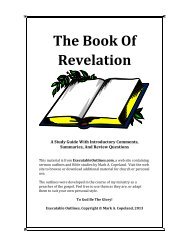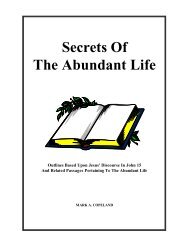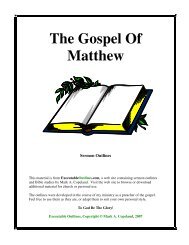The Epistle To The Hebrews - Executable Outlines
The Epistle To The Hebrews - Executable Outlines
The Epistle To The Hebrews - Executable Outlines
Create successful ePaper yourself
Turn your PDF publications into a flip-book with our unique Google optimized e-Paper software.
. With these two major differences:<br />
1) Jesus took not the blood of goats and calves, but His own blood<br />
2) Jesus entered “once for all”, not once a year<br />
2. With His blood, He “obtained eternal redemption”<br />
a. This is why He does not need to offer His blood every year - cf. He 10:10-12<br />
b. But His redemption is “eternal” in another sense, as seen later in verse 15<br />
Mark A. Copeland<br />
B. THE CONSCIENCE IS PURGED OF SIN... (13-14)<br />
1. <strong>The</strong> blood of animals was able to purify the flesh of an unclean person<br />
2. But the blood of Christ is able to purge the conscience from dead works (i.e., sin) to serve<br />
the living God<br />
a. <strong>The</strong> animal sacrifices could not do this - cf. He 9:9-10; 10:1-2<br />
b. For the daily and annual sacrifices constantly reminded them of sin - He 10:3<br />
c. <strong>The</strong>refore Christ not only removes the “legal” guilt of sin, but also the “inward” (or<br />
emotional) guilt of sin!<br />
C. THERE IS REDEMPTION FOR SINS UNDER THE FIRST COVENANT... (15)<br />
1. His role as Mediator of the New Covenant is not limited to those who came after it became<br />
of force<br />
2. His death covers not only sinners since His death, but also those who lived under the first<br />
covenant, who were called to receive the promise of eternal inheritance!<br />
-- In providing atonement for those before and after His death, Jesus has truly “obtained<br />
eternal redemption”<br />
[<strong>The</strong> service rendered by its High Priest certainly makes the “heavenly sanctuary” a superior one! As<br />
one contemplates the meaning of Christ’s death in its relation to the heavenly sanctuary, there is much to<br />
consider, and the author proceeds to explain further why...]<br />
III. ITS MINISTRY NECESSITATED A COSTLY SACRIFICE (16-22)<br />
A. TO INITIATE A NEW TESTAMENT... (16-17)<br />
1. A testament, or will, requires the death of the one who makes it<br />
2. It does not become of force until the testator dies<br />
-- <strong>The</strong> New Covenant with its heavenly sanctuary is like a testament, then, requiring Jesus’<br />
death for it to become of force<br />
B. TO DEDICATE A NEW COVENANT... (18-23)<br />
1. Consider what was done with the first covenant...<br />
a. It was dedicated with the blood of calves and goats<br />
b. Its tabernacle and furniture were purified with the sprinkling of such blood<br />
2. Should the new covenant require any less?<br />
a. <strong>The</strong> first covenant contained only “copies of the things in the heavens”<br />
b. <strong>The</strong>refore the heavenly things required purification by “better sacrifices” (i.e., Jesus’<br />
own blood)<br />
c. Exactly what is meant by “heavenly things” is unclear<br />
1) Some point to passages like Co 1:20, where even “things in heaven” are reconciled<br />
to God by Jesus’ blood<br />
2) Some believe it has reference to the church, of which the Holy Place in the earthly<br />
tabernacle was typical<br />
Sermons From <strong>Hebrews</strong> 71



